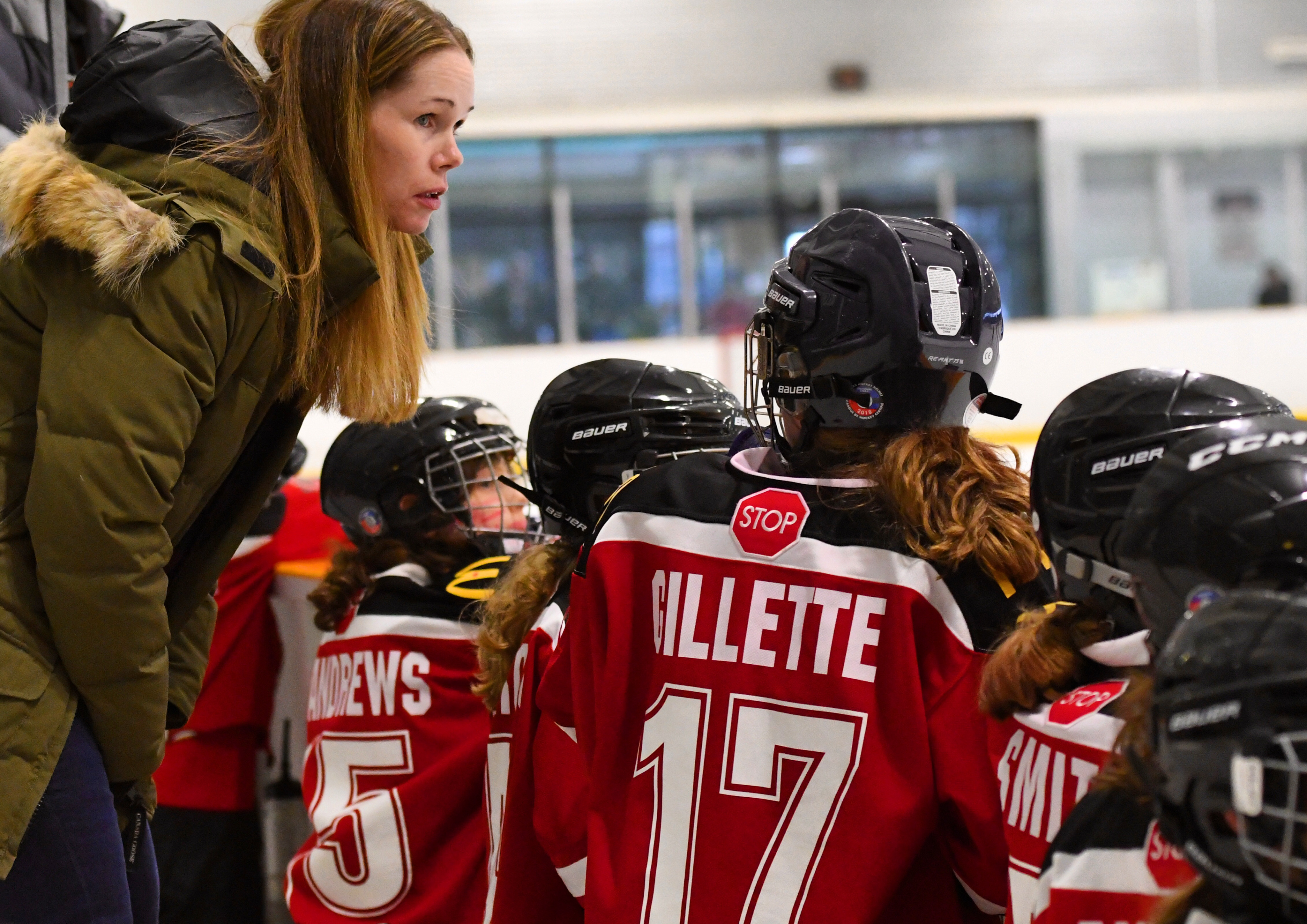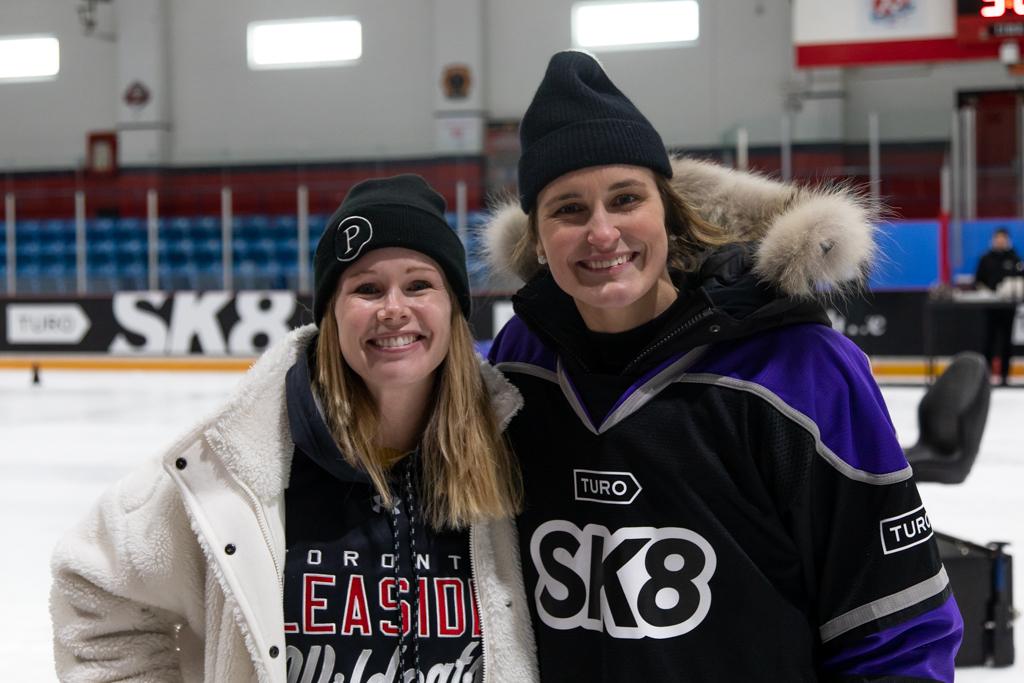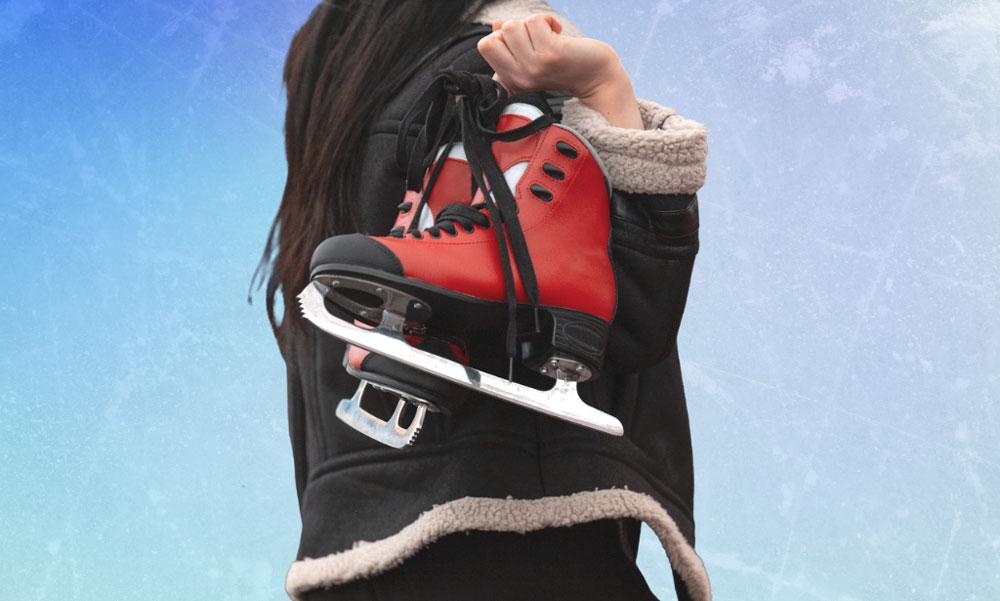Joining a sports team as an adult is not for the faint of heart. Owning up to your deepest sports fantasies takes guts and passion. I should know, as a bench boss screaming from the sidelines, I constantly wondered if I had what it took to take up the greatest game of all time, hockey.
Read Libby’s article: PWHL had its first-ever draft—here’s what happened.

How to get into sports as an adult – don’t take yourself so seriously
Watching my daughters improve season after season at hockey, forging real and lasting friendships with their teammates and developing new physical skills, made me, well, envious. And I had to try to pick up a stick and put on skates for myself.
What took me so long? I knew the game inside and out, both as a fan and coach. But watching and playing are very different. I knew when a player was going offside to call it out. But in my first game on skates, I got caught up on the blue line and was heckled by the referee mercilessly in front of both teams. If you haven’t played hockey before and have no idea why that’s a big deal, I got you. I was “offside,” and in hockey, that’s when a player skates into the offensive zone before the puck gets there. That’s not a good thing in the eyes of the ref.
Just like with every player, I wasn’t immune to mediocre play. I was regularly out of position and often made bad passes out of panic. Each time, I dusted myself off and gave myself a mental pep talk. I couldn’t allow those inner demons to win. I kept telling myself: “You’re not going to be the best out there, but maybe you won’t be the worst either,” “Showing up is the only way to get better at anything in life, and “If it’s tough, it’s probably worth doing!”
How to learn a new skill, ahem, sports skill
Learning a new skill always takes time. You shouldn’t expect success out of the gate. Showing up is honestly the hard part.
According to Harvard Business Review, these principles are key for mastering a new skill (it’s based on work skills, but I’ve revamped it for recreational sports for adults!):
- Pick a sport you find value in. It’ll keep you motivated through any tough lessons and will make you proud when you get compliments on your growth
- Divide the skill up into smaller, manageable tasks. Learn the basics and the rules first, so you know how to play. Then tackle a physical skill, one by one, breaking it down into steps.
- Reflect on what you’ve learned and what you still want to accomplish. Not only will this reiterate how far you’ve come, but it’ll push you to learn more.
- Do not learn in a vacuum. Ask others for guidance and feedback. The perspectives will give you the tools to make any fixes to your form.
- Don’t rely solely on your boss/coach for advice. Talk to your teammates, watch instructional videos on YouTube, and soak up as much as you can.
- It’s not going to happen overnight. It usually takes at least six months to develop a new skill. So be easy on yourself and your ego.

Prepping yourself mentally for adult sports
While lessons and new skills are a great first start for any sport, taking the plunge and signing up for a team is the real first step. You might ask yourself questions like “Will I fit in?”, “Will I know anyone?”, “Will I suck?”, “Will I embarrass or injure myself?” Know that it’s never as hard as you think it’ll be.
While I convinced myself I was going to puke in my helmet during my first shift, I didn’t. Even that is a win in my books! Instead, I skated my butt off, put in a good workout and even had a few laughs after.
Practice makes perfect for adult teams and sports rec leagues
Finding your footing with your new team mostly comes down to luck. Unless you know someone on the team, it’s a challenge to walk into a locker room full of strangers. Especially if you’re an introvert. As your pre-game jitters kick in and silence balloons in the room like an elephant sucking out all the air, it’s easy to want to give up before you even begin. But the risk is so worth the reward. And after a few games, you and your crew will begin to gel. You start to have some successes. You get to know each other. You cheer each other on. And before you know it, you’re winning!
In fact, there are five stages for a team to develop:
- Forming: This is when everyone is given their positions and the coach guides the team.
- Storming: Now the team plays, and the players interact and begin to deal with challenges in play.
- Norming: The players learn from each other, and are comfortable enough to give feedback. Team leaders start to establish themselves here.
- Performing: With a good sense of each other’s weaknesses and strengths, the players adapt game strategies to amplify their strengths.
- Adjourning: This is when there are shifts in the team structure. Some players move on or are injured, and the remaining players have to adjust to continue the success they saw in the fourth stage.
So, it’s not just you learning, it’s the entire team that is growing together. And you would be an integral part of that – no matter your skill level.
Playing the good ol’ hockey game
Now that I’m settling into season two, I get to give a leg up to the next generation of new players, some are even in their 60s! What I’ve learned: There’s room for everyone. You just have to make it to the ice (or maybe court, wherever!). It’s never too late to start a sport, and you’re never too old to play.
Where to play adult rec sports in Canada as a newbie and have fun
Here are some resources I found helpful, and hope that you do, too.
Sister Sports operates rec-level leagues for women 35+ in Toronto for volleyball, ice hockey, basketball and pickleball
For co0ed players looking for a variety of sports, JamSports boasts adult leagues around Ontario, Winnipeg and Michigan.
Toronto’s Leaside Wildcats are celebrating its 50th year. Its players know it as a leader in women’s ice hockey and player development. Senior leagues offer rep players a distinct fast-paced game, while house league offers balanced teams to ensure safe play.
Sports Leagues Canada offers year-round soccer, basketball and softball tournaments and leagues to join, including co-ed sports.
Average Joe Sports Club is where you can sign up to play dodgeball, softball, ultimate frisbee, flag football and floor hockey to mostly west-end communities.
Vancouver’s Urban Rec proudly offers a smattering of sports to athletes and those who want to be in British Columbia.


